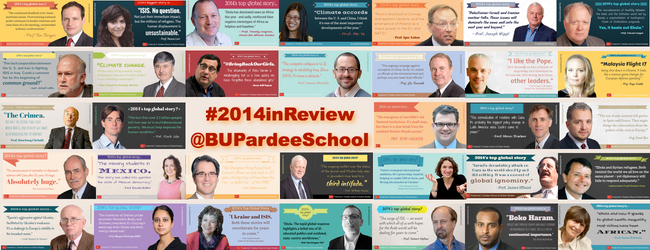What Was The Top Global Story of 2014?
The faculty at the Frederick S. Pardee School of Global Studies at Boston University may not agree on what was the single most important global news or event of the year 2014, but one thing they will all agree on is that it was one busy year for global affairs. Maybe, too busy.
All through the month of December we asked professors at the Pardee School what they thought were the most important global news stories or events of 2014. We have been posting their views on our Twitter feed (with the hashtag #2014inReview). You can also see a breakdown of all our professors’ views in a Buzzfeed listicle.
At the end of the year, no single story stands out above all others. But the range of events that, according to our faculty, could have far-reaching impacts well beyond 2014 is broad, and in many cases, quite ominous.
Here is a quick sampling of the events and stories from 2014 that our faculty think will leave a deep and lasting shadow on the future (check our Twitter archive for their slightly more detailed views):
Not surprisingly, the rise of new and more brutal than ever extreme terrorist groups in Iraq and Syria (ISIS/ISIL) was amongst the most common themes, raised differently by Professors Robert Hefner, Margaret Litvin, Robert Loftis, Noora Lori, Jeremy Menchik and Vivien Schmidt. On a related note, Dean Adil Najam and Professor Michael Woldemariam highlighted the rise of the equally brutal Boko Haram in Africa. Ambassador Paul Hare pointed towards the attendant refugee crisis in Syria.
Also not surprising was the choice of events in Eastern Europe, fermented by a new Russian aggression in Ukraine and the Crimea. This was raised, variously, by Professors Houchang Chehabi, Walter Connor, Michael Corgan, Igor Lukes, Kaija Schilde and Vivien Schmidt.
Different aspects of the Ebola crisis were highlighted in the choices made by Professors Ivan Arreguin-Toft, Susan Eckstein, Paul Hare and Timothy Longman.
The events related to the enflared Israel-Palestine conflict were the focus of concerns reflected in the choices made by Professors James Iffland, William Keylor and Joseph Wippl.
China, unsurprisingly, made its way into our faculty’s preocupations about the future. But in varied ways. Professor Thomas Berger pointed towards lingering Asian maritime deadlocks, Professor Joseph Fewsmith alerted us to the long-term implications of the campaign against corruption in China, while Professor William Grimes argued that the shaddow of the Shanghai-Hong Kong Stock Connect would have deep and lasting impacts on the global economy.
While the shift in US policy towards Cuba came late in the year, and after a number of our faculty had already announced their choices, it was selected by Professors David Scott Palmer and Strom Thacker as their top choice.
For Professors Richard Augustus Norton and Min Ye, the issues that were the most meaningful related to global climate change, and what was done and not done about it in 2014.
An array of other choices reflected the wide variety of issues the Pardee School faculty works on and also the very turbulent world we live in. For example, Prof. Henrik Selin selected persistent global poverty as his key issue. Professor Joseph Wippl highlighted the implications of Iran-US nuclear talks. Professor Renata Keller pointed towards the missing students in Mexico, while Professor Manjari Chatterjee-Miller felt that the election of Narendra Modi as India’s new Prime Minister would have a lasting impact.
Professor Kevin Gallagher felt that the story to keep an eye on was about the new BRICS-led financial institutions. Professor Cornel Ban‘s choice suggested that the rise of anti-austerity left-leaning parties in Spain and Greece could shift politics and economics in Europe, with gobal implications.
In an unusual choice that reflected hope, Professor Eugenio Menegon pointed towards the enthusiasm a new Pope has brought across the globe.
All indications are that 2015 will be no less eventful than 2014 was. Pardee School professors will be following, commenting on, writing about, and researching these global events as diligently as they did this year. Do follow us on Twitter @BUPardeeSchool to keep pace with what they are up to.
Meanwhile, on behalf of all our faculty, here is wishing the world a happy, a prosperous, and perhaps a peaceful new year.
